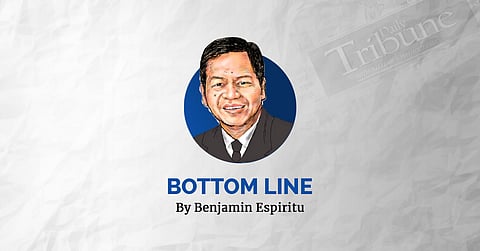
- NEWS
- the EDIT
- COMMENTARY
- BUSINESS
- LIFE
- SHOW
- ACTION
- GLOBAL GOALS
- SNAPS
- DYARYO TIRADA
- MORE

Today, our nation finds itself besieged by a multitude of intense and interwoven crises.
We have a political crisis. The President and the Vice President are at odds. The Senate and the House of Representatives are, to say the least, not on the best of terms. The Judiciary, particularly the Supreme Court, is being criticized by many quarters.
Corruption is no longer something the citizens complain about among themselves, but has been publicly denounced by the President in his State of the Nation Address.
We have a territorial security crisis in the West Philippine Sea. Despite the 2016 arbitral ruling that upheld the Philippines’ claim, Chinese aggression in our territorial waters continues.
Just last Monday, a Chinese Navy warship collided with a China Coast Guard vessel off Scarborough Shoal in what the Armed Forces of the Philippines Chief-of-Staff said was a deliberate attempt to ram a Philippine Coast Guard ship.
We have an education crisis. This has been highlighted by the World Bank report on Learning Poverty, the report of the Second Congressional Commission on Education (EDCOM 2), and the results of the Program for International Student Assessment (PISA), among others.
The President himself stated in his SoNA: “Malinaw sa atin ang tumambad na realidad tungkol sa ating mga kabataan ngayon — ang kakulangan sa kaalaman at kakayahan, lalo na sa matematika, sa agham, sa pagbabasa, at sa wastong pag-unawa” (The reality that has emerged regarding our youth today is clear — their lack of knowledge and skills, especially in math, science, reading, and comprehension).
We have an environmental crisis. The recent flooding across the country was not merely a consequence of corruption, but of the lack of care for our environment.
We have an economic crisis. Despite the Philippine Statistics Authority figure of a 0.9-percent inflation rate for July, the lived experience of everyone I have talked to tells a different story. They all say the cost of living remains burdensome. The Social Weather Stations survey conducted on 25-29 June found 49 percent of families rating themselves as poor and another 10 percent rating themselves as borderline.
We have many other problems that need to be resolved. However, the preceding are the major ones that need to be addressed immediately. They will not self-correct, and if left unsolved, will lead to the further deterioration of the country.
What we need is principled, effective governance, first and foremost in the public sector and mirrored in the private sector. We need leaders at both the national and local levels who are competent, fair, honest, transparent, and accountable. Leaders who lead by example, reject corruption, eliminate inefficiency, and uphold justice without compromise. A government that is friendly to all nations, yet beholden to none. A government that lives and breathes public service — in thought, word and deed.
In a democratic society, government leaders are chosen through the ballot. Elected officials, in turn, appoint others to serve. Thus, the responsibility for having good government officials actually begins with the people. They must choose leaders who are capable, ethical, patriotic, and effective. Citizens must demand accountability and refuse to tolerate wrongdoing.
Power resides with the people — but only if they claim it. In the end, a nation gets the government it deserves.
